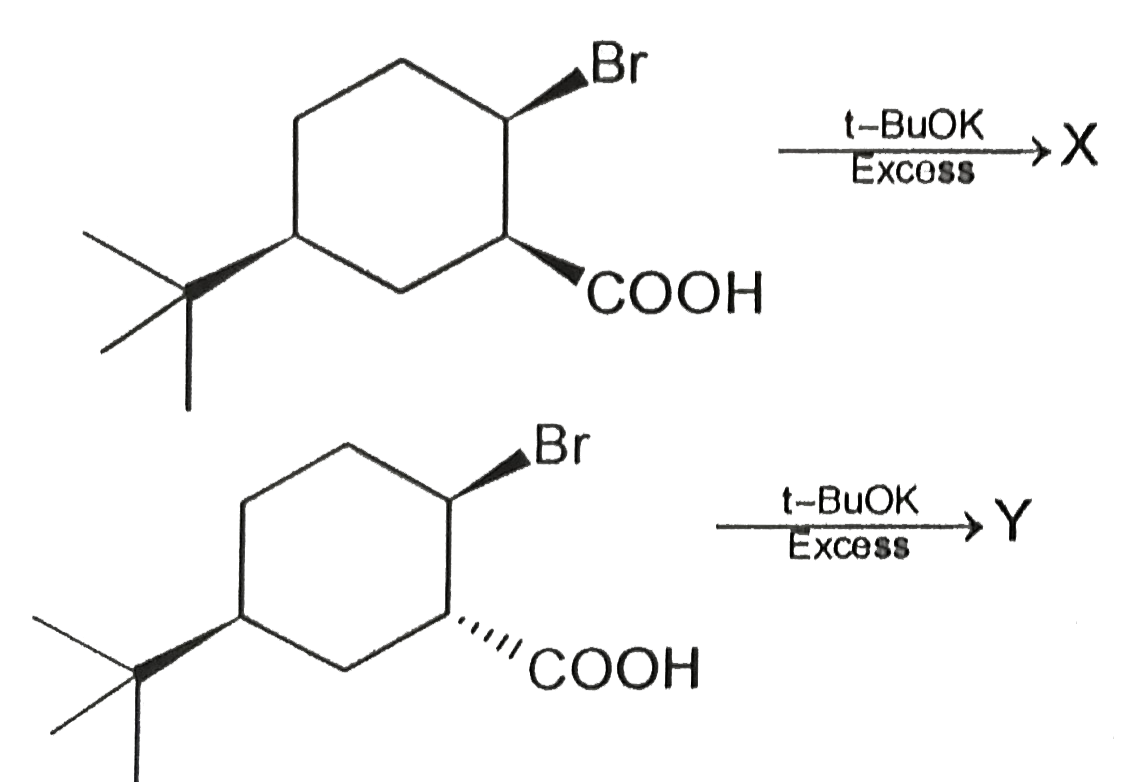Which of the following option is valid for zero reaction?
t1/2=32t1/4
t1/2=43t1/4
t1/2=2t1/4
t1/4=(t1/2)2
The correct Answer is:C
To solve the question regarding the valid option for a zero-order reaction, we need to derive the expressions for the half-life (t₁/₂) and the quarter-life (t₁/₄) of a zero-order reaction and then find their ratio.
1. Understanding Zero-Order Reaction:
- In a zero-order reaction, the rate of reaction is constant and does not depend on the concentration of the reactant.
- The general form of the rate equation for a zero-order reaction is:
Rate=k
- The concentration of the reactant (A) at time t can be expressed as:
(A)=(A0)−kt
where (A₀) is the initial concentration and k is the rate constant.
2. Deriving the Half-Life (t₁/₂):
- The half-life is the time required for the concentration of the reactant to reduce to half of its initial concentration.
- Setting (A) = (A₀)/2 in the equation:
(A0)2=(A0)−kt1/2
- Rearranging gives:
kt1/2=(A0)−(A0)2=(A0)2
- Therefore, we can express t₁/₂ as:
t1/2=(A0)2k
3. Deriving the Quarter-Life (t₁/₄):
- The quarter-life is the time required for the concentration of the reactant to reduce to one-fourth of its initial concentration.
- Setting (A) = (A₀)/4 in the equation:
(A0)4=(A0)−kt1/4
- Rearranging gives:
kt1/4=(A0)−(A0)4=3(A0)4
- Therefore, we can express t₁/₄ as:
t1/4=3(A0)4k
4. Finding the Ratio of t₁/₂ to t₁/₄:
- Now we can find the ratio of t₁/₂ to t₁/₄:
t1/2t1/4=(A0)2k3(A0)4k=(A0)2k⋅4k3(A0)=46=23
5. Conclusion:
- The ratio of the half-life to the quarter-life for a zero-order reaction is 23.
- Therefore, we check the options provided in the question to find the one that corresponds to this ratio.
Final Answer:
- The correct option is C, as it represents the valid ratio for a zero-order reaction.
- In a zero-order reaction, the rate of reaction is constant and does not depend on the concentration of the reactant.
- The general form of the rate equation for a zero-order reaction is:
Rate=k
- The concentration of the reactant (A) at time t can be expressed as:
(A)=(A0)−kt
where (A₀) is the initial concentration and k is the rate constant.
- The half-life is the time required for the concentration of the reactant to reduce to half of its initial concentration.
- Setting (A) = (A₀)/2 in the equation:
(A0)2=(A0)−kt1/2
- Rearranging gives:
kt1/2=(A0)−(A0)2=(A0)2
- Therefore, we can express t₁/₂ as:
t1/2=(A0)2k
- The quarter-life is the time required for the concentration of the reactant to reduce to one-fourth of its initial concentration.
- Setting (A) = (A₀)/4 in the equation:
(A0)4=(A0)−kt1/4
- Rearranging gives:
kt1/4=(A0)−(A0)4=3(A0)4
- Therefore, we can express t₁/₄ as:
t1/4=3(A0)4k
- Now we can find the ratio of t₁/₂ to t₁/₄:
t1/2t1/4=(A0)2k3(A0)4k=(A0)2k⋅4k3(A0)=46=23
- The ratio of the half-life to the quarter-life for a zero-order reaction is 23.
- Therefore, we check the options provided in the question to find the one that corresponds to this ratio.
- The correct option is C, as it represents the valid ratio for a zero-order reaction.
Similar Questions
Knowledge Check
Which of the following options is correct ?
AStenothermal organismEurythermal organismFrogLizardBStenothermal organismEurythermal organismFrogManCStenothermal organismEurythermal organismManLizardDStenothermal organismEurythermal organismPolar bearCoconut treeWhich of the following options is correct ?
AStenothermal organismEurythermal organismFrogLizardBStenothermal organismEurythermal organismFrogManCStenothermal organismEurythermal organismManLizardDStenothermal organismEurythermal organismPolar bearCoconut treeWhich of the following options is correct ?
AStenothermal organismEurythermal organismFrogLizardBStenothermal organismEurythermal organismFrogManCStenothermal organismEurythermal organismManLizardDStenothermal organismEurythermal organismPolar bearCoconut tree
 Which of the following options is correct ?
Which of the following options is correct ?
